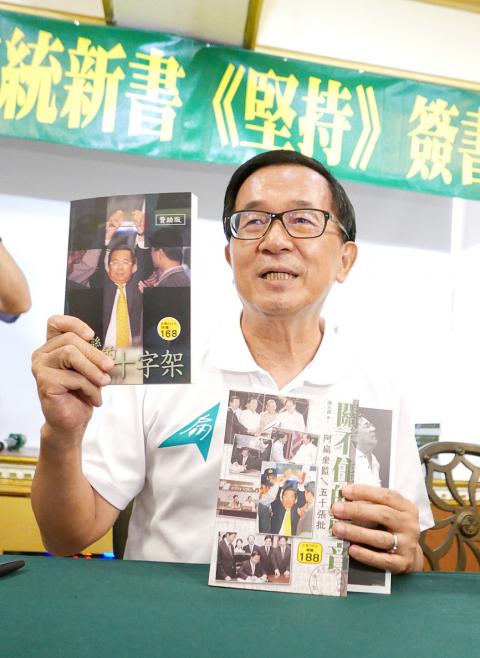A group of Taiwanese independence supporters are on Aug. 18 to form a new political party whose Chinese-language name (一邊一國行動黨) roughly translates to “One Side One Country Action Party.”
While former premier Yu Shyi-kun, a Democratic Progressive Party (DPP) member, has refused to head the new party, he has agreed to be its “most senior adviser,” a source said yesterday.
Former National Taipei University of the Arts president Yang Chyi-wen (楊其文) is most likely to be the party’s chairman, the source added.

Photo: Tsai Shu-yuan, Taipei Times
Yang declined to comment, saying that he was only a founding member of the party and that any decision on its chairperson would have to wait until its inception ceremony in Taipei on Aug. 18.
Other founding members include Taipei Hospital vice president Kuo Chang-feng (郭長豐), retired physician Kuo Cheng-deng (郭正典) and Janice Chen (陳昭姿), a member of former president Chen Shui-bian’s (陳水扁) volunteer civilian medical team.
Janice Chen said that the party’s platform is clear: Taiwan and China are sovereign nations.
The party would nominate individuals for next year’s legislative elections, she added.
Kuo Cheng-deng said that Yu had turned down the offer, because he did not wish to antagonize the DPP.
Chen Shui-bian, noted for saying in 2002 during his presidency that there is “one country on either side” (一邊一國) of the Taiwan Strait, on Saturday last week expressed support on Facebook for the idea of forming the new party.
While he has denied founding the party or being its spiritual leader, many within the new party perceive him as such, sources said.

Alain Robert, known as the "French Spider-Man," praised Alex Honnold as exceptionally well-prepared after the US climber completed a free solo ascent of Taipei 101 yesterday. Robert said Honnold's ascent of the 508m-tall skyscraper in just more than one-and-a-half hours without using safety ropes or equipment was a remarkable achievement. "This is my life," he said in an interview conducted in French, adding that he liked the feeling of being "on the edge of danger." The 63-year-old Frenchman climbed Taipei 101 using ropes in December 2004, taking about four hours to reach the top. On a one-to-10 scale of difficulty, Robert said Taipei 101

Nipah virus infection is to be officially listed as a category 5 notifiable infectious disease in Taiwan in March, while clinical treatment guidelines are being formulated, the Centers for Disease Control (CDC) said yesterday. With Nipah infections being reported in other countries and considering its relatively high fatality rate, the centers on Jan. 16 announced that it would be listed as a notifiable infectious disease to bolster the nation’s systematic early warning system and increase public awareness, the CDC said. Bangladesh reported four fatal cases last year in separate districts, with three linked to raw date palm sap consumption, CDC Epidemic Intelligence

Taiwanese and US defense groups are collaborating to introduce deployable, semi-autonomous manufacturing systems for drones and components in a boost to the nation’s supply chain resilience. Taiwan’s G-Tech Optroelectronics Corp subsidiary GTOC and the US’ Aerkomm Inc on Friday announced an agreement with fellow US-based Firestorm Lab to adopt the latter’s xCell, a technology featuring 3D printers fitted in 6.1m container units. The systems enable aerial platforms and parts to be produced in high volumes from dispersed nodes capable of rapid redeployment, to minimize the risk of enemy strikes and to meet field requirements, they said. Firestorm chief technology officer Ian Muceus said

MORE FALL: An investigation into one of Xi’s key cronies, part of a broader ‘anti-corruption’ drive, indicates that he might have a deep distrust in the military, an expert said China’s latest military purge underscores systemic risks in its shift from collective leadership to sole rule under Chinese President Xi Jinping (習近平), and could disrupt its chain of command and military capabilities, a national security official said yesterday. If decisionmaking within the Chinese Communist Party has become “irrational” under one-man rule, the Taiwan Strait and the regional situation must be approached with extreme caution, given unforeseen risks, they added. The anonymous official made the remarks as China’s Central Military Commission Vice Chairman Zhang Youxia (張又俠) and Joint Staff Department Chief of Staff Liu Zhenli (劉振立) were reportedly being investigated for suspected “serious